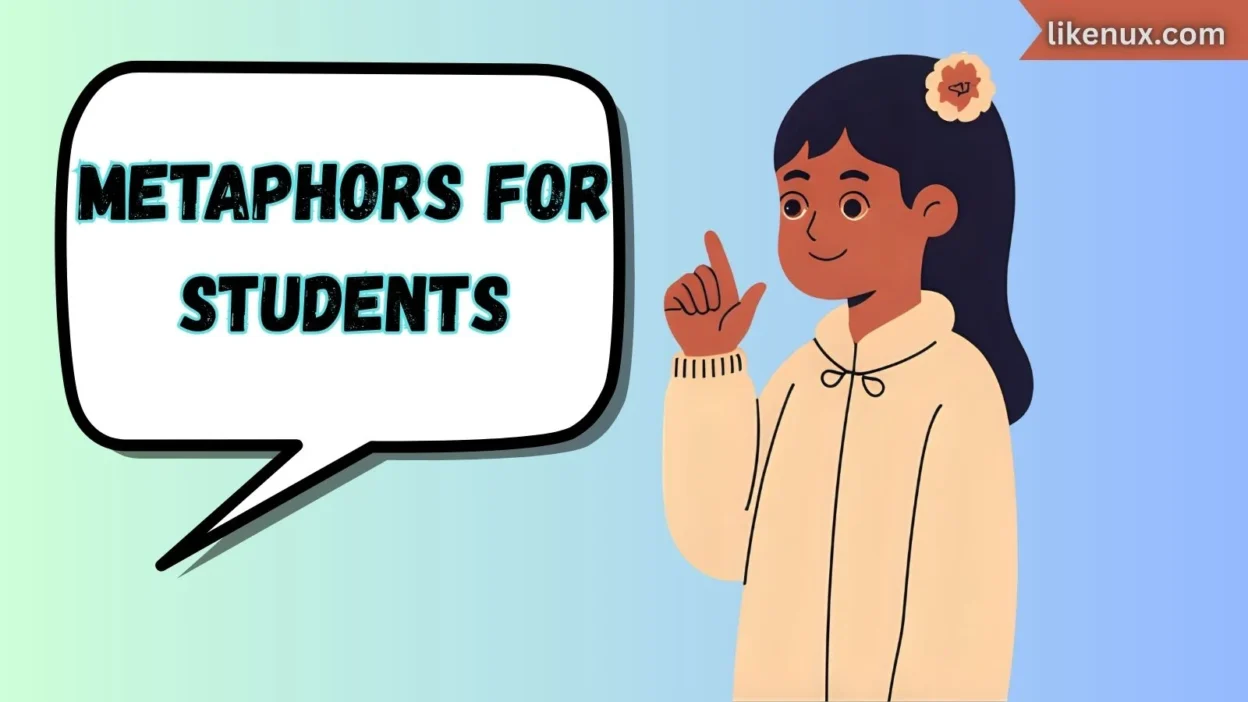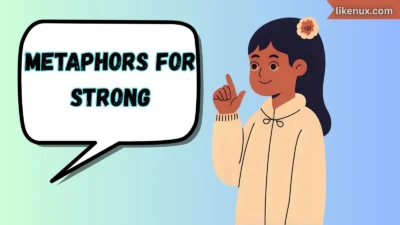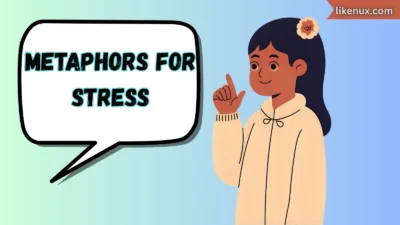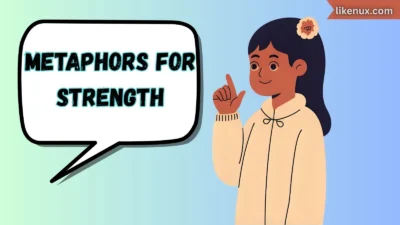Being a student is more than just attending classes and doing homework; it’s a journey filled with growth, discovery, and transformation. Over the years, I’ve seen how powerful metaphors can be when describing the student experience. They bring warmth, clarity, and depth to our words, making communication more meaningful. Metaphors for Students.
In this article, I’ll share 25 metaphors for students, carefully chosen to help you express admiration, encouragement, and understanding. Each metaphor comes with its meaning, an example in a sentence, its best use, and alternative ways to phrase it. Whether you’re a teacher, parent, mentor, or student yourself, these metaphors will help you communicate with empathy, care, and inspiration.
1. Students are Seeds Waiting to Grow
Meaning: Every student has the potential to bloom when nurtured.
Sentence: Students are like seeds waiting to grow under the guidance of teachers.
Best Use: To inspire patience and highlight potential.
Other Ways to Say: Learners in the making, budding minds.
Read More: Metaphors for Success
2. Students are Blank Pages
Meaning: They carry space for new ideas and experiences.
Sentence: Each student is a blank page waiting for knowledge to be written.
Best Use: When emphasizing the importance of guidance and learning.
Other Ways to Say: Fresh canvas, untold story.
3. Students are Sponges
Meaning: They absorb knowledge quickly when provided.
Sentence: Young students are like sponges, soaking up every bit of information.
Best Use: To stress their ability to learn rapidly.
Other Ways to Say: Quick learners, absorbers of knowledge.
4. Students are Travelers on a Journey
Meaning: Education is a long road with many milestones.
Sentence: Students are travelers on a journey, learning with every step.
Best Use: When encouraging persistence.
Other Ways to Say: Knowledge explorers, pathfinders.
5. Students are Clay to Be Molded
Meaning: Their character and skills take shape with guidance.
Sentence: Students are clay to be molded by teachers and experiences.
Best Use: To describe growth through influence.
Other Ways to Say: Shaping minds, forming potential.
6. Students are Rising Stars
Meaning: They are on their way to shining brightly.
Sentence: Every student is a rising star, waiting for their moment to glow.
Best Use: Encouragement and motivation.
Other Ways to Say: Emerging talents, future achievers.
7. Students are Explorers of Knowledge
Meaning: They search and discover new information.
Sentence: Students are explorers of knowledge, uncovering new worlds with curiosity.
Best Use: To celebrate curiosity.
Other Ways to Say: Discoverers, seekers of truth.
8. Students are Gardens of Dreams
Meaning: Their goals and aspirations bloom with care.
Sentence: Students are gardens of dreams, waiting for the right environment to flourish.
Best Use: To talk about nurturing ambition.
Other Ways to Say: Fields of hope, dream cultivators.
9. Students are Architects of Their Future
Meaning: They build their own paths with choices.
Sentence: Students are architects of their future, designing step by step.
Best Use: Career and personal growth discussions.
Other Ways to Say: Future builders, self-designers.
10. Students are Uncut Diamonds
Meaning: Their true brilliance comes out with effort and learning.
Sentence: Students are uncut diamonds, polished by hard work and guidance.
Best Use: Motivation in difficult times.
Other Ways to Say: Hidden gems, rough jewels.
11. Students are Sunflowers Facing Knowledge
Meaning: They turn towards the light of learning.
Sentence: Students are like sunflowers, always seeking the light of wisdom.
Best Use: To symbolize positivity and growth.
Other Ways to Say: Light seekers, wisdom followers.
12. Students are Builders of Tomorrow
Meaning: They will shape the world’s future.
Sentence: Students are builders of tomorrow, creating the foundation of society.
Best Use: In speeches or motivation.
Other Ways to Say: Tomorrow’s leaders, world shapers.
13. Students are Books Being Written
Meaning: Their stories unfold with time.
Sentence: Students are books being written, each chapter a new lesson learned.
Best Use: To stress uniqueness.
Other Ways to Say: Stories in progress, unfolding lives.
14. Students are Athletes in Training
Meaning: They practice daily to master skills.
Sentence: Students are athletes in training, preparing for life’s big game.
Best Use: When encouraging practice.
Other Ways to Say: Learners in rehearsal, trainees.
15. Students are Lighthouses in the Making
Meaning: One day, they will guide others.
Sentence: Students are lighthouses in the making, soon to shine as beacons for others.
Best Use: To inspire mentorship and leadership.
Other Ways to Say: Guiding lights, future mentors.
16. Students are Artists of Their Lives
Meaning: They create their future with imagination.
Sentence: Students are artists of their lives, painting their journey with choices.
Best Use: To highlight creativity.
Other Ways to Say: Life creators, dream painters.
17. Students are Warriors of Knowledge
Meaning: They fight challenges through learning.
Sentence: Students are warriors of knowledge, battling ignorance with wisdom.
Best Use: To encourage resilience.
Other Ways to Say: Knowledge fighters, truth seekers.
18. Students are Bridges to the Future
Meaning: They connect today with tomorrow.
Sentence: Students are bridges to the future, carrying society forward.
Best Use: In motivational contexts.
Other Ways to Say: Future connectors, tomorrow’s link.
19. Students are Candles Waiting to Shine
Meaning: With learning, they light up the world.
Sentence: Students are candles waiting to shine brightly with wisdom.
Best Use: To emphasize enlightenment.
Other Ways to Say: Torches of knowledge, lights in the dark.
20. Students are Engineers of Possibility
Meaning: They design solutions for tomorrow.
Sentence: Students are engineers of possibility, creating opportunities where none existed.
Best Use: To spark innovation.
Other Ways to Say: Innovators, possibility builders.
21. Students are Stars in a Constellation
Meaning: Each plays a role in the larger picture.
Sentence: Students are stars in a constellation, contributing to the beauty of society.
Best Use: To stress teamwork.
Other Ways to Say: Collective lights, cosmic learners.
22. Students are Pilots of Their Destiny
Meaning: They steer their own future.
Sentence: Students are pilots of their destiny, navigating through life’s skies.
Best Use: Career motivation.
Other Ways to Say: Navigators, self-pilots.
23. Students are Rivers of Potential
Meaning: They flow with endless possibilities.
Sentence: Students are rivers of potential, carrying energy and ideas forward.
Best Use: When celebrating capability.
Other Ways to Say: Streams of talent, flowing opportunities.
24. Students are Builders of Bridges
Meaning: They connect cultures, ideas, and generations.
Sentence: Students are builders of bridges, bringing communities closer.
Best Use: Cultural and social growth.
Other Ways to Say: Peace builders, connection makers.
25. Students are Dream Catchers
Meaning: They hold onto ambitions and make them real.
Sentence: Students are dream catchers, turning visions into reality.
Best Use: To inspire determination.
Other Ways to Say: Goal seekers, ambition holders.
FAQs about Metaphors for Students
1. Why use metaphors for students?
Metaphors make communication richer, inspiring students while showing empathy and understanding.
2. How do metaphors help in teaching?
They simplify complex ideas and make learning more relatable.
3. Can students use these metaphors themselves?
Yes! Students can use them in essays, speeches, or even self-reflection.
4. Which metaphor is best for motivation?
Metaphors like rising stars and warriors of knowledge are particularly uplifting.
5. How can teachers benefit from using metaphors?
They build stronger connections, inspire learners, and create a supportive classroom atmosphere.
Conclusion
Being a student is one of the most transformative experiences in life. Through these 25 metaphors, we see that students are more than learners; they are dreamers, creators, explorers, and future leaders. By using these thoughtful expressions, teachers, parents, and mentors can better communicate their care, encouragement, and belief in every learner’s potential.

David Robert is a passionate innovator driven by creativity, vision, and purpose. He turns bold ideas into impactful realities through focus, leadership, and dedication.



